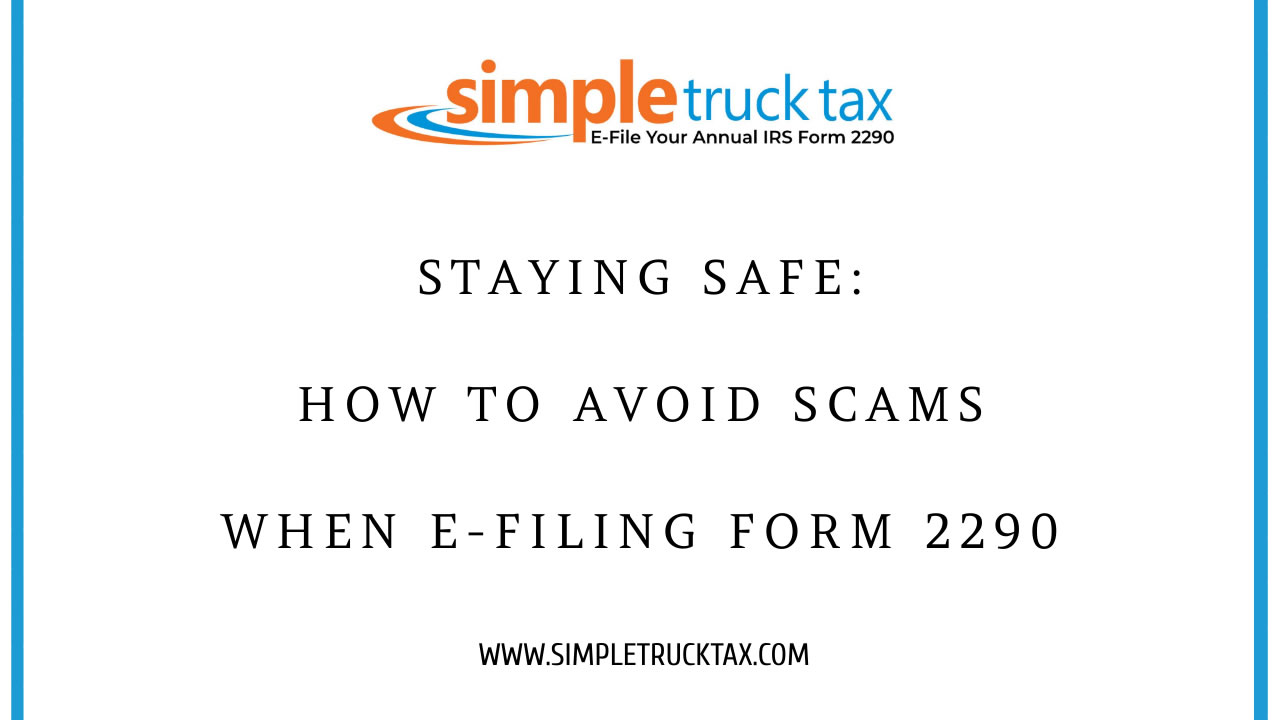
Staying Safe: How to Avoid Scams When E-Filing Form 2290
As we approach the deadline for e-filing Form 2290 for heavy highway vehicles, it's important to be aware of potential scams that could harm you or your business. E-filing Form 2290 is a convenient way to pay your Heavy Vehicle Use Tax (HVUT) and receive your stamped Schedule 1, but it also opens the door for scammers to take advantage of unsuspecting filers. Here are some tips to help you stay safe and avoid scams when e-filing Form 2290.
Beware of Phishing Emails and Websites
One common scam targeting e-filers is phishing emails and websites that mimic the IRS or reputable e-filing services. These emails may ask for personal or financial information, such as your Social Security number, bank account details, or credit card information. It's important to remember that the IRS will never contact you via email to request this information. If you receive an email that seems suspicious, do not click on any links or provide any personal information. Instead, forward the email to the IRS at phishing@irs.gov.
Use Secure Websites
When e-filing Form 2290, make sure you are using a secure website and that your information is being transmitted securely. Look for websites that have https in the URL and a padlock icon in the address bar. This indicates that the website is using encryption to protect your data. Additionally, make sure the e-filing service you are using is reputable and has a track record of securely processing tax returns.
Avoid Third-Party Services
While there are legitimate third-party services that can help you e-file Form 2290, be cautious when sharing your personal and financial information with these companies. Some third-party services may not have adequate security measures in place to protect your data, putting you at risk for identity theft or fraud. If you choose to use a third-party service, make sure they are accredited by the IRS and have a secure website for transmitting your information.
Be Wary of Unsolicited Calls
Another common scam targeting taxpayers is unsolicited phone calls from individuals claiming to be IRS agents. These scammers often use scare tactics to intimidate taxpayers into providing sensitive information or making payments over the phone. Remember that the IRS will never call you without first sending a notice in the mail. If you receive a suspicious phone call, hang up and report it to the IRS.
Stay Informed
The best way to protect yourself from scams when e-filing Form 2290 is to stay informed and aware of potential threats. Keep up to date on the latest IRS alerts and warnings about tax scams, and educate yourself on how to recognize and avoid phishing emails, fraudulent websites, and other scams. By staying vigilant and taking precautions, you can help protect yourself and your business from falling victim to tax-related scams.
E-filing Form 2290 is a convenient and efficient way to pay your HVUT, but it also comes with risks. By following these tips and staying informed about potential scams, you can help protect yourself and your business from falling prey to fraudsters. Remember to always verify the legitimacy of the e-filing service you are using, avoid sharing sensitive information with third parties, and be cautious of unsolicited communications from individuals claiming to be IRS agents. Stay safe and stay informed to ensure a smooth and secure e-filing experience.
Note: For more information, visit IRS website